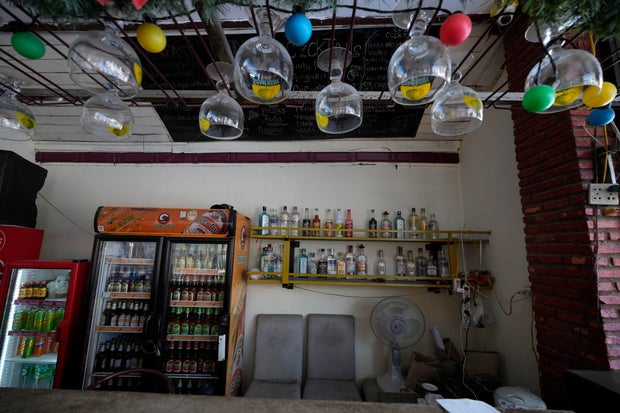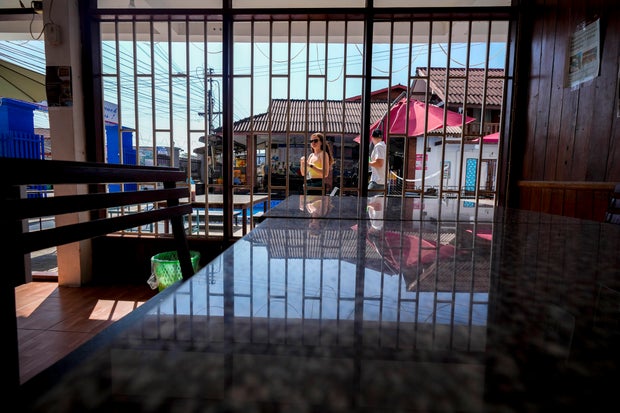CBS News
Beijing half-marathon organizers investigating whether competitors let Chinese runner win

Authorities have opened an investigation after video from the finish line at a the Beijing half-marathon raised questions about whether other athletes let a Chinese runner win the race.
A now-viral video shows Kenyan runners Robert Keter and Willy Mnangat and Ethiopian runner Dejene Hailu running in a pack with Chinese runner Jie He, 25. At one point, the runner closest to He appears to wave him over, and He cross their path. They stick in a pack until the very end, when He beats the rest by a mere second.
He received the the first place medal, while the three other runners tied for second place, BBC Sport reports. Social media users in China criticized the results of the race, prompting officials to open an investigation.
China Stringer Network via Reuters
The Beijing Sports Bureau said it is investigating and will announce the results once they are available, AFP reported. CBS News has reached out to the bureau for a statement and is awaiting response.
World Athletics, which hosted the half-marathon on Sunday, April 14, said in a statement to CBS News that they are aware of the video and investigation. “The integrity of our sport is the highest priority at World Athletics, while this investigation is ongoing we are unable to provide further comment,” the group said.
He, who won the gold medal for the marathon at the 2023 Asian Games, holds the record for China in the event, according to BBC Sport.
One social media user on the Chinese platform Weibo called the half-marathon race “no doubt the most embarrassing title” of He’s career. Another said the alleged incident “pushes sportsmanship to the ground in shame.”
He and the event are sponsored by Chinese sports brand Xtep, which told Chinese state-owned news site The Paper that the situation is “still being confirmed and verified by multiple parties.”
CBS News
Police carry out controlled explosion after suspicious package found near U.S. Embassy in London

Police in London carried out a controlled explosion Friday after finding a suspicious package near the U.S. Embassy in the British capital. They blocked off at least one road near the embassy compound, which sits on the south side of the Thames river in the Nine Elms neighborhood.
“We can confirm that the ‘loud bang’ reported in the area a short time ago was a controlled explosion carried out by officers,” London’s Metropolitan Police said in a statement posted online.
The embassy said in its own social media post that police had closed a road near the building out of “an abundance of caution.”
Mina Kim/REUTERS
The U.S. Embassy in London opened in its new location just outside the center of the city at the beginning of 2018. It sits on a sprawling campus relatively far from most public roads and is surrounded by security fortifications.
CBS News
Anti-fraud efforts meet real-world test during ACA enrollment period

Unauthorized switching of Affordable Care Act plans appears to have tapered off in recent weeks based on an almost one-third drop in casework associated with consumer complaints, say federal regulators. The Centers for Medicare & Medicaid Services, which oversees the ACA, credits steps taken to thwart enrollment and switching problems that triggered more than 274,000 complaints this year through August.
Now, the annual ACA open enrollment period that began Nov. 1 poses a real-world test: Will the changes curb fraud by rogue agents or brokerages without unduly slowing the process of enrolling or reducing the total number of sign-ups for 2025 coverage?
“They really have this tightrope to walk,” said Sabrina Corlette, co-director of the Center on Health Insurance Reforms at Georgetown University. “The more you tighten it up to prevent fraud, the more barriers there are that could inhibit enrollment among those who need the coverage.”
CMS said in July that some types of policy changes — those in which the agent is not “affiliated” with the existing plan — will face more requirements, such as a three-way call with the consumer, broker, and a healthcare.gov call center representative.
In August, the agency barred two of about a dozen private sector online-enrollment platforms from connecting with healthcare.gov over concerns related to improper switching.
And CMS has suspended 850 agents suspected of being involved in unauthorized plan-switching from accessing the ACA marketplace.
Still, the clampdown could add complexity to enrollment and slow the process. For example, a consumer might have to wait in a queue for a three-way call, or scramble to find a new agent because the one they previously worked with had been suspended.
Given that phone lines with healthcare.gov staff already get busy — especially during mid-December — agents and policy analysts advise consumers not to dally this year.
“Hit the ground running,” said Ronnell Nolan, president and CEO of Health Agents for America, a professional organization for brokers.
Meanwhile, reports are emerging that some rogue entities are already figuring out workarounds that could undermine some of the anti-fraud protections CMS put in place, Nolan said.
“Bottom line is: Fraud and abuse is still happening,” Nolan said.
Brokers assist the majority of people actively enrolling in ACA plans and are paid a monthly commission by insurers for their efforts. Consumers can compare plans or enroll themselves online through federal or state marketplace websites. They can also seek help from people called assisters or navigators — certified helpers who are not paid commissions. Under a “find local help” button on the federal and state ACA websites, consumers can search for nearby brokers or navigators.
CMS says it has “ramped up support operations” at its healthcare.gov marketplace call centers, which are open 24/7, in anticipation of increased demand for three-way calls, and it expects “minimal wait times,” said Jeff Wu, deputy director for policy of the CMS Center for Consumer Information and Insurance Oversight.
Wu said those three-way calls are necessary only when an agent or a broker not already associated with a consumer’s enrollment wants to change that consumer’s enrollment or end that consumer’s coverage. It does not apply to people seeking coverage for the first time.
Organizations paid by the government to offer navigator services have a dedicated phone line to the federal marketplace, and callers are not currently experiencing long waits, said Xonjenese Jacobs, director of Florida Covering Kids & Families, a program based at the University of South Florida that coordinates enrollment across the state through its Covering Florida navigator program.
Navigators can assist with the three-way calls if a consumer’s situation requires it.
“Because we have our quick line in, there’s no increased wait time,” Jacobs said.
The problem of unauthorized switches has been around for a while but took off during last year’s open enrollment season.
Brokers generally blamed much of the problem on the ease with which rogue agents can access ACA information in the federal marketplace, needing only a person’s name, date of birth, and state of residence. Though federal regulators have worked to tighten that access with the three-way call requirement, they stopped short of instituting what some agent groups say is needed: two-factor authentication, which could involve a code accessed by a consumer through a smartphone.
Unauthorized switches can lead to a host of problems for consumers, from higher deductibles to landing in new networks that do not include their preferred physicians or hospitals. Some people have received tax bills when unauthorized policies came with premium credits for which they did not qualify.
Unauthorized switches posed a political liability for the Biden administration, a blemish on two years of record ACA enrollment. The practice drew criticism from lawmakers on both sides of the aisle; Democrats demanded more oversight and punishment of rogue agents, while Republicans said fraud attempts were fueled by Biden administration moves that allowed for more generous premium subsidies and special enrollment periods. The fate of those enhanced subsidies, which are set to expire, will be decided by Congress next year as the Trump administration takes power. But the premiums and subsidies that come with 2025 plans that people are enrolling in now will remain in effect for the entire year.
The actions taken this year to thwart the unauthorized enrollments apply to the federal marketplace, used by 31 states. The remaining states and the District of Columbia run their own websites, with many having in place additional layers of security.
For its part, CMS says its efforts are working, pointing to the 30% drop in complaint casework. The agency also noted a 90% drop in the number of times an agent’s name was replaced by another’s, which it says indicates that it is tougher for rival agents to steal clients to gain the monthly commissions that insurers pay.
Still, the move to suspend 850 agents has drawn pushback from agent groups that initially brought the problem to federal regulators’ attention. They say some of those accused were suspended before getting a chance to respond to the allegations.
“There will be a certain number of agents and brokers who are going to be suspended without due process,” said Nolan, with the health agents’ group. She said that it has called for increased protections against unauthorized switching and that two-factor authentication, like that used in some state marketplaces or in the financial sector, would be more effective than what’s been done.
“We now have to jump through so many hoops that I’m not sure we’re going to survive,” she said of agents in general. “They are just throwing things against the wall to see what sticks when they could just do two-factor.”
The agency did not respond to questions asking for details about how the 850 agents suspended since July were selected, the states where they were located, or how many had their suspensions reversed after supplying additional information.
KFF Health News is a national newsroom that produces in-depth journalism about health issues and is one of the core operating programs at KFF — the independent source for health policy research, polling and journalism.
CBS News
More tourists die after drinking tainted alcohol in Laos as several people detained

Vang Vieng, Laos — A second Australian teenager who fell critically ill after drinking tainted alcohol in Laos has died in a hospital in Bangkok, her family said Friday, bringing the death toll in the mass poisoning of foreign tourists to six.
Holly Bowles, 19, had been in critical condition on life support following the poisoning in Laos more than a week ago.
“We are so sad to say that our beautiful girl Holly is now at peace,” her family said in a statement sent to Australian Network 10 and other Australian media. “We find comfort and solace in knowing that Holly brought so much joy and happiness to so many people.”
An officer at Vang Vieng’s Tourism Police office, who refused to give his name, told The Associated Press on Friday that a “number of people” had been detained in the case but that no charges have been filed yet. Staff at the Nana Backpacker Hostel, which was still operating but not accepting new guests, confirmed that the manager and owner were among those taken in for questioning.
Anupam Nath / AP
Tourist police offices are common in Southeast Asia and are set up specifically to help with incidents involving tourists and other foreigners.
British and Australian media say about a dozen tourists became ill after a night out on November 12, according to Agence France-Presse.
The U.S. State Department on Friday issued a health alert for citizens traveling in Laos, warning of “suspected methanol poisoning in Vang Vieng, possibly through the consumption of methanol-laced alcoholic drinks,” following similar alerts from other countries whose citizens were involved.
Australia’s prime minister announced Thursday that a 19-year-old citizen, Bianca Jones, had died in a Thai hospital where she had been evacuated for emergency treatment, and that her friend – Bowles – remained in a hospital “fighting for her life.” A 28-year-old British woman, Simone White, also died from suspected methanol poisoning in Laos, the British Foreign Office said.
Anupam Nath / AP
An American and two Danish tourists also died, though specifics about the causes of death have not been released.
New Zealand’s Foreign Ministry said one of its citizens was sickened in Laos and was a possible victim of methanol poisoning.
Laos is a one-party communist state with no organized opposition and the government keeps a tight lid on information. In this case, officials have released almost no details.
The Foreign Ministry has refused to comment, and in Vang Vieng the small hospital where some of the victims are believed to have been treated initially referred all questions to the town’s health office on the hospital grounds. The town health officials refused to comment, saying they lacked proper permission.
Methanol is sometimes added to mixed drinks at disreputable bars as a cheaper alternative to ethanol, but can cause severe poisoning or death. It’s also a byproduct of poorly distilled homebrew liquor and could have found its way into bar drinks inadvertently.
Methanol is used in antifreeze, photocopier fluids, de-icers, paint thinner, varnish, windshield wiper fluid and other industrial and household products.
Landlocked Laos is one of Southeast Asia’s poorest nations and a popular tourist destination. Vang Vieng is particularly popular among backpackers seeking partying and adventure sports.
Neil Farmiloe, a New Zealander who owns the Kiwi Kitchen restaurant in town, said a lot of his customers were very worried about the incident.
“I think it’s never happened before, so it is hopefully just a one-off incident,” said Farmiloe, who has lived in Vang Vieng for 20 years. “It’s very sad all around. I’m sure nobody intended to cause injury, but it’s happened.”
The two 19-year-old Australian women who have both now died fell ill on Nov. 13 following a night out drinking with a group.
They failed to check out from the Nana Backpacker Hostel as planned and were found sick in their room and then taken to Thailand for emergency treatment.
Thai authorities confirmed that Jones had died by “brain swelling due to high levels of methanol found in her system.”
Duong Duc Toan, the manager of the Nana Backpacker Hostel, told the AP the day before he was detained that the two women had joined other guests for free shots of Laotian vodka before heading elsewhere and returning in the early hours of the morning.












